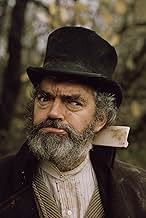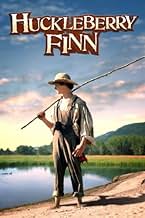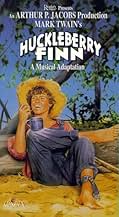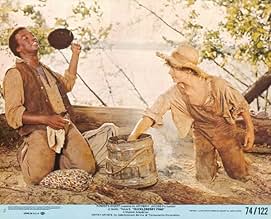In 1840s Missouri, young Huckleberry Finn, wanting to escape his violent drunkard father, joins Black runaway slave Jim on a quest for freedom down the Mississippi River on a raft.In 1840s Missouri, young Huckleberry Finn, wanting to escape his violent drunkard father, joins Black runaway slave Jim on a quest for freedom down the Mississippi River on a raft.In 1840s Missouri, young Huckleberry Finn, wanting to escape his violent drunkard father, joins Black runaway slave Jim on a quest for freedom down the Mississippi River on a raft.
- Director
- Writers
- Stars
- Director
- Writers
- All cast & crew
- Production, box office & more at IMDbPro
Featured reviews
A forgotten relic from the early '70s, when shows like "Little House on the Prairie" and "The Waltons" all reflected our yearning for a so-called simpler, less complicated era. This adaptation, while not entirely faithful to the book, captures its essential themes and spirit rather well. There are some technical problems (the lighting always seem to be half in shadow, whether it's night or day!) and its kiddie-friendly tone seems at odds during the Grangerfords/Shepherdsons sequence, wherein we see men being shot and killed right on camera--and it's handled rather lightly. Parents should also be warned that this adaptation does have some strong language--it has not been sanitized, notwithstanding its G rating.
In addition, the musical format sits much more uneasily with this movie than with the superior "Tom Sawyer" (from the year before, with many of the same cast members and production staff). However, as oddly as some numbers come off, others are wonderful, such as the clever, dixie-ish "Cairo, Illinois," a duet between Huck and Jim that kicks off their great journey together. The jaunty title song and the lovely anthem "Freedom" also showcase the movie and its themes beautifully--especially during "Freedom"'s reprise, as Huck, the boy/man run away, gazes after Jim making his way downriver. Performances are generally strong--Jeff East could've been a better singer but his performance is so sincere and authentic, you hardly notice. Likewise his bond with Jim (well-portrayed by the late Paul Winfield) comes through nicely, most especially in their final, very moving scene together. Harvey Korman and David Wayne also deliver terrific turns as the King and the Duke, respectively.
Cinematography is *gorgeous*--the DP took full advantage of the location shoot, with some beautiful silhouette shots. Although its prequel is far better (you simply cannot top "Tom Sawyer"'s terrific score and thoroughbred cast), Mark Twain's quintessential Great American novel is reasonably well-served here, if not transcendently.
In addition, the musical format sits much more uneasily with this movie than with the superior "Tom Sawyer" (from the year before, with many of the same cast members and production staff). However, as oddly as some numbers come off, others are wonderful, such as the clever, dixie-ish "Cairo, Illinois," a duet between Huck and Jim that kicks off their great journey together. The jaunty title song and the lovely anthem "Freedom" also showcase the movie and its themes beautifully--especially during "Freedom"'s reprise, as Huck, the boy/man run away, gazes after Jim making his way downriver. Performances are generally strong--Jeff East could've been a better singer but his performance is so sincere and authentic, you hardly notice. Likewise his bond with Jim (well-portrayed by the late Paul Winfield) comes through nicely, most especially in their final, very moving scene together. Harvey Korman and David Wayne also deliver terrific turns as the King and the Duke, respectively.
Cinematography is *gorgeous*--the DP took full advantage of the location shoot, with some beautiful silhouette shots. Although its prequel is far better (you simply cannot top "Tom Sawyer"'s terrific score and thoroughbred cast), Mark Twain's quintessential Great American novel is reasonably well-served here, if not transcendently.
I'm back to deliver another commentary after reading the book. Like the book, I couldn't wait for the movie to be done. I thought the ending got smoothed out a little bit, but it was a "musical adaptation" of the story, so if you wanted the mess that was the ending of the book, this isn't the place to look for it.
Speaking of which, I'd love to see a musical movie of Big River, which is the 80s musical version of the book. It has fabulous music, and while it also smooths out the ending, the music more than makes up for it.
The most enjoyable part of the movie was seeing Harvey Korman's The King. I was secretly hoping that Tim Conway would end up being The Duke, and that would have been awesome. But he was great, as he always was on Carol Burnett and other roles.
Speaking of which, I'd love to see a musical movie of Big River, which is the 80s musical version of the book. It has fabulous music, and while it also smooths out the ending, the music more than makes up for it.
The most enjoyable part of the movie was seeing Harvey Korman's The King. I was secretly hoping that Tim Conway would end up being The Duke, and that would have been awesome. But he was great, as he always was on Carol Burnett and other roles.
This adaptation of the famous tale by Mark Twain starts with a song performed by Roberta Flack. My recommendation is to listen to the song, then not bother watching the rest of the film.
It does not take long to realize that the familiar story has been changed odiously and unforgivingly to fit another vision that is nowhere near as quaint and clever as Twain's. The writers have hijacked the famous title, changed the story, sanitized it in a way that recalls the censorship cases of the past, removed the authentic dialect, extracted the charm, and added music. We might ask why.
Apparently, to serve their own agenda. Then why not create this other story under another title, rather than usurping Twain's reputation? The result they have achieved with this modified piece is as inauthentic as a Bach fugue with its notes changed. Those who celebrate Twain's writing skills, his peerless wit, and his hard work preserving the native dialects of his time and location will find this to be a shallow (and dishonest) tweaking of Twain's timeless classic.
It does not take long to realize that the familiar story has been changed odiously and unforgivingly to fit another vision that is nowhere near as quaint and clever as Twain's. The writers have hijacked the famous title, changed the story, sanitized it in a way that recalls the censorship cases of the past, removed the authentic dialect, extracted the charm, and added music. We might ask why.
Apparently, to serve their own agenda. Then why not create this other story under another title, rather than usurping Twain's reputation? The result they have achieved with this modified piece is as inauthentic as a Bach fugue with its notes changed. Those who celebrate Twain's writing skills, his peerless wit, and his hard work preserving the native dialects of his time and location will find this to be a shallow (and dishonest) tweaking of Twain's timeless classic.
Actually, not a bad film that follows the Twain book pretty well (probably because it's a Readers Digest production), but is about as dated as the book actually is and a product of the era in which the story takes place. This doesn't mean that the overall film doesn't hold a place in either American literature or film history. It's a musical without being an overpowering musical (which is good for me since I'm not a musical fan). Unfortunately, I see modern audiences avoiding this film without appreciating its innocence and morals and original intentions. If you've seen this film, what did you think of it?
Unnecessary and unsatisfying musical rendering of Mark Twain's classic "Adventures of Huckleberry Finn". At least, it captures the genuine friendship between Jeff East (as Huckleberry Finn) and Paul Winfield (as Jim). However, these two performers are much more likable in other projects. Interestingly, Mr. East portrayed "Huck" in 1973's similarly presented re-make of "Tom Sawyer", which was considered the better film. In my opinion, East would have been a better "Tom" than "Huck". Some of the photography is rather nice, especially during the more moody ending. The Sherman-Sherman musical numbers are well below standard. The movie doesn't seem much like the book. Roberta Flack sings "Freedom" to end it all, at last.
*** Huckleberry Finn (1974) J. Lee Thompson ~ Jeff East, Paul Winfield, Harvey Korman
*** Huckleberry Finn (1974) J. Lee Thompson ~ Jeff East, Paul Winfield, Harvey Korman
Did you know
- TriviaThis was the first musicalization of Huckleberry Finn. The next one happened 10 years later in 1985, on Broadway; it was "Big River." a hit show which ran for several years and won seven Tonys, including Best Musical.
- Quotes
Huckleberry Finn: I don't give a damn what the whole world says, 'cause if I'm doin' wrong--well--well, I hope I roast in hell forever.
- ConnectionsFollows Tom Sawyer (1973)
- How long is Huckleberry Finn?Powered by Alexa
Details
- Release date
- Country of origin
- Official site
- Language
- Also known as
- Mark Twain's Huckleberry Finn: A Musical Adaptation
- Filming locations
- Production companies
- See more company credits at IMDbPro
Box office
- Budget
- $3,000,000 (estimated)
- Runtime1 hour 58 minutes
- Color
- Aspect ratio
- 2.35 : 1
Contribute to this page
Suggest an edit or add missing content































